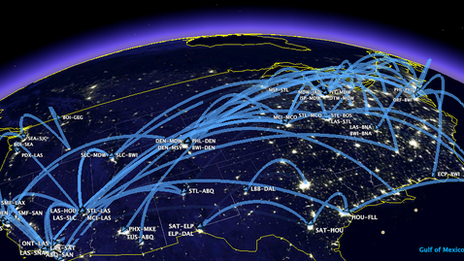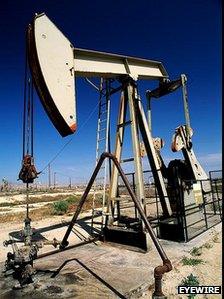Business turns to ants and algorithms in search for profit
- Published

Foraging ants are the inspiration for a mathematical formula that helps companies deliver products more quickly
We're unlikely to see ants invading corporate boardrooms any time soon, but these tiny insects are helping save some of the world's biggest companies a small fortune.
For they are the inspiration behind just one of the complex mathematical formulae that a growing number of corporations are embracing as a way to gain competitive advantage.
These so-called algorithms use vast amounts of raw data to provide solutions to complex problems, from streamlining supply chains to where best to drill for oil.
A handful of companies already use them, such as logistics firms looking for the fastest way to deliver goods, and supermarkets tracking customers' buying patterns to decide what to stock and where to stack it.
In fact, they can be so revealing that US retailer Target was reportedly able to discover a teenage customer was pregnant before even her family knew.
But the benefits of complex mathematical modelling, thanks in large part to advances in computing power that have led to an explosion in the collection of raw data, are becoming more widely recognised - not just by profit-hungry businesses, but by public institutions and even the judiciary.
Insects rule
Algorithms are generally dreamt up by PhD mathematicians, who take their inspiration not just from numerical patterns but from nature and human behaviour.
.jpg)
Mr Danner says algorithms can be used to help solve any problem
Foraging ants are just one example. When finding food, they lay down pheromones to mark the route to and from their nest. If something disrupts the route, the next-best alternative is quickly found. It is, therefore, what is known as a "self-healing" route.
George Danner, director of UK analytics firm Torus Business Web, says an algorithm based on ant foraging is perfect for helping companies find the optimum route for getting their products from A to B.
He has worked with a US energy major to do just this, helping it ship oil across the Gulf of Mexico more efficiently.
Other mathematical formulations such as Monte Carlo simulation, Game Theory and the like have different applications.
Mr Danner has worked with one the of biggest retailers in the US, using algorithms to help decide where best to position new stores around the country to maximise sales, and with a leading US airline to cut fuel costs by moving flight times and refuelling locations, for example.
He has also helped a major UK energy utility to understand how future demand for energy may be affected by changes in all manner of variables, such as the oil price, weather, electric vehicle use and renewable energy production.
By understanding better future demand patterns, the utility is more able to ensure it has systems in place robust enough to meet them.
Algorithms can even be used to reduce overall energy demand, by using data collected by smart meters to help shape consumer behaviour and increase energy efficiency.
Serving justice
But it's not all about the application of complex maths - the mindset needed to solve problems is also important.
"It's about looking at business problems through the lens of science," says Mr Danner.
"It's just a way of thinking - it's not rocket science. You just have to be logical, attentive to detail, systematic and methodical."
Challenging the status quo, he says, is key.
By using this approach, Mr Danner devised a process designed to help the UK criminal justice system process cases faster, by grouping together similar kinds of offences. To a mathematician, the judiciary is just like any other factory, with complex moving parts that interact on many different levels.

Algorithms can be used to help airlines cut fuel costs by making flight paths and refuelling more efficient
He has also worked with US oil group Anadarko to help it choose drilling locations. Previously, the company stuck to the rule that no exploration well could be drilled unless at least 5,000 acres of land surrounding the site had been leased to ensure rivals had no claim on the oil.
No-one could explain why, just that it was always thus.
So Mr Danner devised a model to test this rule, and promptly found that, in some more exotic locations, it made little sense. Some wells needed far less land, some a great deal more.
Businesses the world over, he says, are hampered by similar "rules" passed down from one corporate generation to the next.
Wider innovation
An increasing number of companies are finding that mathematical models can expose these rules on the way to providing solutions to complex problems.
They are, says Mr Danner, like an X-ray that allow company executives to visualise potential scenarios to make better-informed decisions, executives who up till now have not had access to the necessary skills and technology needed to devise and run the algorithms.

Some oil companies use algorithms to help decide where to drill
Spreadsheets, their preferred analysis tool to date, are simply not up to the job.
And as data becomes more accessible and computers more powerful, more small- and medium-sized companies are starting to take a more mathematical approach to problem solving.
And not just to one area such as supply chain or delivery, but to their entire business model.
In fact, in some cases, the business model itself is based around algorithms. For example, online entertainment provider Netflix relies on an algorithm for matching customer preferences, while private jet firm Netjet was set up by a maths professor who devised a formula for fractional ownership.
According to Mr Danner, there is no limit to the use of maths, not just in business, but in society at large. In fact, he believes algorithms can be used to solve any problem.
"As we sit here in 2012, we are almost unlimited in what we can do. The only limitations to solving the world's problems are ignorance and apathy."
Algorithms already stand behind the majority of share trading in the US and are increasingly being embraced in the financial markets of Europe and Asia. They have also been adopted by some sports team owners using so-called Moneyball theory to help achieve success on the field.
Now it would appear algorithms are working their way into the wider business world. For now at least, the march of the mathematicians seems unstoppable.
- Published26 September 2011
- Published23 August 2011